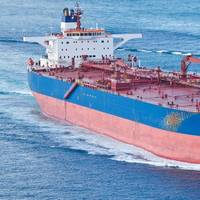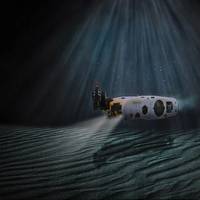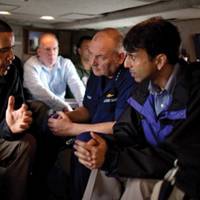U.S. and Gulf Allies Face Task Protecting Oil Shipping Lanes

The United States and its allies may need to to start escorting commercial vessels to prevent further attacks in Gulf oil shipping lanes, Gulf sources and experts said.Even then, the conventional naval and air capabilities of Western and Gulf powers tasked with policing vital commercial waters may be of limited use against the asymmetric warfare tactics suspected in recent operations, including naval mines.Six tankers have been hit in the past month in two attacks near the Strait of Hormuz…
Preventing Nuclear Smuggling at U.S. Ports
The subcommittees are meeting today to examine the efforts of the Department of Homeland Security to prevent the smuggling of nuclear materials in U.S. ports and other port security risks. This hearing follows last year’s hearing which examined the prevention and response to a dirty bomb at a U.S. port. It seems clear that Islamic extremists aspire to carry out a radiological attack, so this is a threat we need to take seriously. If they succeed even once, the consequences would be catastrophic. To be prepared, we must ensure that we have the proper screening and response protocols in place. Today we will continue to review these efforts as well as broader governmental efforts to reduce threats to our ports.
Saab Develops Underwater Anti-IED Robot

Designed to combat below-the-surface terrorism, Sea Wasp is the latest generation remotely operated vehicle (ROV) from defense and security company Saab. Presented at the Navy League’s Sea-Air-Space Exposition in National Harbor, Md., Sea Wasp has been engineered to relocate, identify and neutralize underwater improvised explosive devices (IEDs). While most underwater IED threats are disposed of manually by trained explosive ordnance disposal (EOD) divers, Sea Wasp is operated remotely by two-person teams from the surface, allowing operators to keep a safe distance from the explosives.
Thad Allen at the Helm

Former USCG Admiral Thad Allen is a transformational leader in the history of the service, a rock through thick and thin. Today he talks about resource allocation, risk management and homeland security. As part of Booz Allen Hamilton’s Justice and Homeland Security business group, Executive Vice President and former U.S. Coast Guard Admiral Thad Allen leads the development of thought leadership and client engagements regarding the future direction of law enforcement and homeland security. The Coast Guard is under pressure to either pare its mission mix or downscale what it does.
$3B for FY'08 Port Security Grant Program
The Department of Homeland Security (DHS) said that over $3 billion is being allocated for various homeland security grant programs in fiscal year 2008. As indicated in the Overview, the Port Security Grant Program (PSGP) is funded at $388.6 million for FY08. Eligible applicants for port security grants include: owners and operators of federally regulated terminals, facilities, or US inspected passenger vessels; port authorities or other state and local agencies that provide layered security protection to federally-regulated facilities; consortia of local stakeholders (such as river groups, ports, and terminal associations) representing federally-regulated ports…
Senator Warner: Tech from Dahlgren Impacts Tomorrow’s Navy

By John J. After a wide-ranging tour of Naval District Washington (NDW) West in Dahlgren, Va., Senator John W. Warner, R-Va., told reporters at a news conference last week that the Naval Surface Warfare Center Dahlgren Division (NSWCDD) is transforming itself to face the present and future on many fronts by producing advanced technological products that have a crucial impact in the support and protection of deployed warfighters fighting the Global War on Terrorism. “I have seen some absolutely fascinating technology in the minds of the core of civilians and military that operate here…
DoN Budget Request for FY08 Addresses Near and Long-term Needs
The nation’s top Navy and Marine Corps leaders told members of Congress March 1 that the Department of the Navy’s (DoN) proposed $139.8 billion budget request for fiscal year 2008 (FY08) fully supports near and long-term warfighting requirements and will help win the global war on terror (GWOT). In testimony before the House Armed Services Committee, Secretary of the Navy (SECNAV) Donald C. Winter, Chief of Naval Operations (CNO) Adm. Mike Mullen and Commandant of the Marine Corps Gen. James Conway thanked lawmakers and the American people for their continued support and stressed the impact of DoN’s FY08 budget request on future readiness.
Congress Passes Port Security Bill
Congress has passed the Security and Accountability for Every (SAFE) Port Act of 2006, the first legislation of its kind to authorize an annual federal funding level to help secure United States ports against terrorism. The bill, H.R. 4954, calls for $400m in federal Port Security Grant (PSG) funding for each of the next five years to help increase security in the maritime transportation system. recognized Representatives Dan Lungren (R-CA) and Jane Harman (D-CA) for introducing and moving their version of the port security legislation through the House. He credited Senators Susan Collins (R-ME; chair, Senate Committee on Homeland Security & Government Affairs) and Patty Murray (D-WA)…
Hearing – Homeland Security: The Next Five Years
The Senate Committee on Homeland Security and Governmental Affairs conducted a hearing entitled Homeland Security: The Next Five Years. As explained in her opening statement, Senator Susan M. Collins (R-ME) wants to assess the homeland security challenges the next five years will bring. Michael Chertoff, Secretary of Homeland Security, discussed those challenges, including port and maritime security. He noted that not every risk can be eliminated, so the goal is to prioritize the threats and address those of highest importance. Among the various witnesses, Richard A. Falkenrath, Deputy Commissioner for Counterterrorism, New York City Police Department, stated that the threat of a weapon of mass destruction in a shipping container has been exaggerated.
Senate Panel OKs $517.7b Defense Bill
The Senate Armed Services Committee approved a $517.7b fiscal 2007 defense authorization bill, a 4 percent increase over the amount authorized by Congress last year. The bill, which includes a $50b bridge fund to pay for operations in Iraq and Afghanistan during the first six months of fiscal 2007, totals $4.8b more than authorized by the House Armed Services Committee. The Senate panel, which met behind closed doors, boosted funding for several weapons programs, including the addition of $1.5b to the Navy's shipbuilding accounts, largely due to concerns about the "declining size of the fleet," according to a summary of the bill released by the committee.





